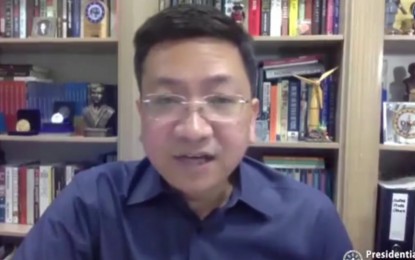
DILG Undersecretary Jonathan Malaya (Screengrab from NTF-ELCAC virtual presser)
MANILA – Majority of local government units (LGUs) across the country have already declared the Communist Party of the Philippines-New People's Army-National Democratic Front (CPP-NPA-NDF) persona non grata in their respective localities, an official of the Department of the Interior and Local Government (DILG) said on Monday.
In a virtual press conference, DILG Undersecretary Jonathan Malaya said 1,463 or 84 percent of a total of 1,715 LGUs nationwide have already passed resolutions declaring members of the communist terrorist groups (CTGs) as unwelcome in their respective areas.
“This means that 84 percent of the LGUs nationwide have formally expressed their denouncement of CTGs through duly approved and promulgated issuances of their Sanggunian (council). This is the first time in the history of the Republic of the Philippines since the beginning of the CTG problem 53 years ago that we have had this unprecedented support from our local government officials,” Malaya, also a spokesperson of the National Task Force to End Local Communist Armed Conflict (NTF-ELCAC), said.
Among the country's 17 regions, Malaya said six regions have a 100 percent declaration of the CPP-NPA-NDF as persona non grata --- Central Luzon, Mimaropa, Central Visayas, Zamboanga Peninsula, Soccsksargen, and the Cordillera Administrative Region (CAR).
He added that four regions are nearing an absolute declaration of persona non grata, with Ilocos Region at 99 percent declaration, Cagayan Valley at 98 percent, Calabarzon at 94 percent, and Northern Mindanao at 95 percent.
In Metro Manila, Malaya said nine out of 17 LGUs have passed resolutions condemning the atrocities of the CTGs and declaring CPP-NPA-NDF as persona non grata – Caloocan, Las Piñas, Mandaluyong, Muntinlupa, Navotas, Pasig, Quezon City, San Juan and Valenzuela.
The remaining LGUs, he said, are in various stages of deliberation in their respective provincial, city, and municipal councils.
"In fact, sila po ay kinasusuklaman ng mamamayang Pilipino dahil sa dala nilang karahasan sa kanilang pangingikil, at sa kanilang pagsira sa mapayapang pamumuhay lalong lalo ng mga kabataang pilipino, mga IP (Indigenous peoples) at kahit na mga urban poor (In fact, they are hated by the Filipino people because of the violence brought by their extortion activities, their destruction of the peaceful way of life especially of the young Filipinos, IP groups and even urban poor groups)," he added.
Ensure general welfare
Malaya said the issuance of resolutions declaring the CTGs as persona non grata is in line with the Local Government Code which aims to ensure the general welfare of the people, enhance economic development and social justice and maintain peace and order.
“Yan ang tungkulin ng isang LGU at ipinasa itong mga resolution na ito alinsunod sa kanilang tungkulin na nakasaad mismo sa Local Government Code. Itong mga CTG na ito, sila’y nagpapanggap, na sila ay kaibigan ng mga maralita, subalit ang totoo'y sila ay gumagamit sa mga maralita para sa isang walang saysay at makasariling ideolohiya. Sila ang tunay na salot at virus ng ating lipunan (Those are the duties of the LGUs and these resolutions were passed in accordance with their duties as stated in the Local Government Code. These CTGs are pretending to be a friend of the poor, but in reality, they are using the poor for a meaningless and selfish ideology. They are the true menace and virus in our society),” he explained.
Malaya, meanwhile, said this gesture of LGUs is an assurance that “we have allies in this war against communist terrorism.’’
He said that as one of the lead implementing agencies in localizing Executive Order (EO) No. 70, the DILG remains steadfast in working closely with the local government units (LGUs) to end the decades-long problem of insurgency in the Philippines.
“Kami po sa NTF-ELCAC at ang DILG ay nagpapasalamat (We at the NTF-ELCAC and the DILG are truly grateful) for the support of more LGUs in the fight against communist terrorism and we are looking forward to these numbers increasing every year. With greater challenge to the pandemic, more people in far flung communities and in urban centers are vulnerable to the advances of the CPP-NPA-NDF as such we must work hard to address these challenges and bring lasting peace in all of our communities,” said Malaya.
He added that this move of the LGUs simply shows that the CTG cannot fool the people through their pretentious and manipulative schemes.
The DILG’s programs, he said, assure the government’s continuous bid to attain genuine peace in the country.
These include the Retooled Community Support Program (RCSP), Capacitating Urban Communities for Peace and Development (CUCPD), Barangay Development Program (BDP), and the Enhanced Comprehensive Local Integration Program (E-CLIP).
“RCSP is a convergence mechanism for local governments to identify issues and needed government interventions,’’ Malaya explained.
Under the RCSP, Malaya noted that 1,331 out of the 1,394 target barangays are undergoing the implementation of the various phases of the program.
Aside from the RCSP, the DILG implements the CUCPD as a platform for convergence and collaboration among all stakeholders in improving the institutional capacity of LGUs in urban areas.
Under the BDP, a total of PHP12.3-billion or 75 percent of the total budget of PHP16.44-billion for the 822 BDP recipients have been released to recipient LGUs as of May 23, accounting for a total of 1,756 projects whose allocations were approved by the Department of Budget and Management (DBM).
As of May 21, the E-CLIP has benefited a total of 6,418 former rebels (FRs) and Militia ng Bayan who have been provided with financial assistance. 3,965 of these are regular NPAs while 2,453 are Militia ng Bayan.
The CPP-NPA is listed as a terrorist organization by the United States, European Union, the United Kingdom, Australia, Canada, New Zealand, and the Philippines. (PNA)
